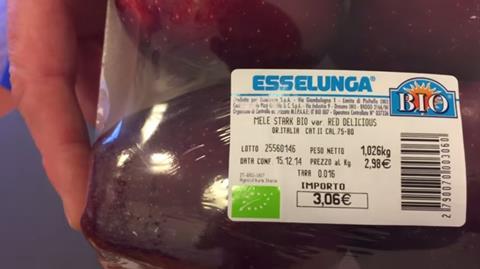
A video posted by a Milan-based blogger has courted controversy in Italy after purporting to show that domestically grown apples sold by leading retailer Esselunga under its Bio organic label are coated in chemical-based artifical waxes.
Ste Calvos published the video (shown below) at the end of 2014, and since then more than 347,000 people have watched the video on YouTube and a further million or so views have been registered on Facebook.
Employing a decidely unscientific method based mainly on his own sense of smell, the author tries to show that organic apples sold by Esselunga have undergone an unnatural waxing process.
Calvos is shown in the video scraping the skin of an Esselunga Bio Red Delicious apple with a knife. He then proceeds to burn the resulting flakes of residue with a standard cigarette lighter before sniffing the resulting smoke and stating that he is “sure that it is not something natural”.
Italian fresh produce website Italiafruit News, in which Eurofruit is a media partner, spoke to Giovanni Lercker, a professor at the Agrarian Faculty of the University of Bologna and a leading expert in the field of food substance composition, for his reaction.
“It is worth pointing out that in apples, more than in other fruits, the skin is covered with a thin layer of naturally waxy material consisting predominantly of organic compounds in particular (cutin and suberine),” he explained. “Free fatty acids, fatty alcohols and hydrocarbons as well as real waxy substances are produced spontaneously.”
The function of such compounds, Lercker said, was to reduce the rate of water loss from the fruit and protect it from pests, both in the field and after harvesting.
The amount of wax on any apple depended on the variety, he added: “Compared to similar rubbing tests carried out on other cultivars it is safe to assume that the Stark Delicious seen in the video contains higher amounts of this thin wax.”
He concluded: “A consumer watching this video should not worry about the healthiness of the apple because they are waxes that are naturally produced by the plant and present also on other fruits.
“The technique [used in the video] makes it possible to detect non-natural waxes, for example hydrocarbon-based substances derived from the paraffin.”
Nevertheless, those who have worked in the international apples business will know that it is not unusual for artificial waxes like Morpholine to be used on fresh apples in order to maintain freshness and provide them with the kind of glossy sheen popular in certain parts of the world, or indeed a waxy coating such as DPA to be applied in order to prevent scald.
However, regulatory changes in recent years have banned the use of some of these substances on apples sold in Europe.






No comments yet